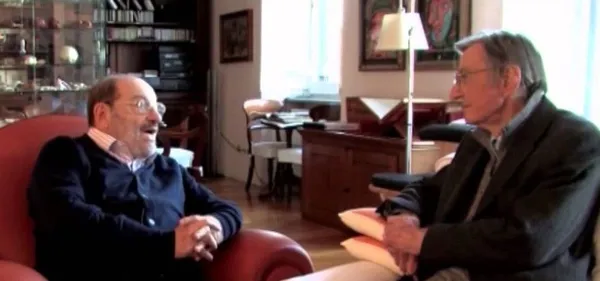Eye For Film >> Movies >> The Neorealism: We Were Not Just Bicycle Thieves (2013) Film Review
The Neorealism: We Were Not Just Bicycle Thieves
Reviewed by: Jennie Kermode

Let's face it: if you're looking for a lightweight, easy access introduction to Neorealism the you're probably trying to learn about the wrong genre. For all that they set out to create accessible cinema that spoke to working class people's experiences, the Neorealists themselves took a distinctly intellectual approach to their work, so it's right that this film should do likewise - and impressive that, in the process, it manages to include contributions from some of the greatest thinkers of the past century.
The film takes the form of a lecture presented by Carlo Lizzani (director of films like The Violent Four and Bitter Rice; here speaking just months before his death). Standing in a book-lined study with a large, shaggy dog reclining in a leather chair beside him, he talks us through the movement from the very beginning, using the visual tricks on the genre to illuminate his speech. A window becomes a magical portal through which we glimpse scenes from genre classics, as if we were stepping out into the streets to become part of what's happening, the aim of many genre contributors. It begins, of course, with the theft of a bicycle and the pleas of a sad-eyed boy, but there's a long way to travel, and more secret ways to slip in and out of this enchanted world. "Dreams and imagination are part of reality too," we are reminded.
As in the best Neorealist works, the transitions here are seamless, the editing superb, and everything has a lucid quality that allows documentary and fiction to intermingle effortlessly. Even the dog seems to behave perfectly on cue. Visually, this echoes Lizzani's early warning about the language of fascism, still dangerous when appropriated by the left in those early, proudly populist post-war works. Soon turned round on itself, however, this language makes room for the amateur actor, with all the rawness such performances bring, and for human landscapes full of diversity (at least in mid-20th century Italian terms) - a challenge to the uniformity on which fascism depended, a refashioning of Italian (and in turn, European) identity. As the movement spread beyond Italy, producing the likes of Citizen Kane, it lost of some of its overtly political character, but none of its impact.
Though it tours through the classics and delivers the clips that fans will be hoping for, this film is more interested in telling than showing, and that's a good thing. Joining Lizzani in the magical room, Umberto Eco talks about how Neorealist cinema opened his eyes, and opines on its particular importance to Americans whose culture forsakes history. In archive footage, Gabriel García Márquez also shares his views, and together - without addressing it directly - both writers remind us that this was and is an artistic movement that stretches beyond the borders of the screen which conceived it.
As in all the best films in the genre, there are subtle moments of humour, and there's an underling playfulness that energises the film and ensures it never feels like a monologue. A final curtain call belongs to everybody, star and crew and dog, drawing back to show us that we were always on a set, bu perhaps when we look around at the world, all of us today with cameras in our hands, we should know that.
Reviewed on: 02 Oct 2015
















